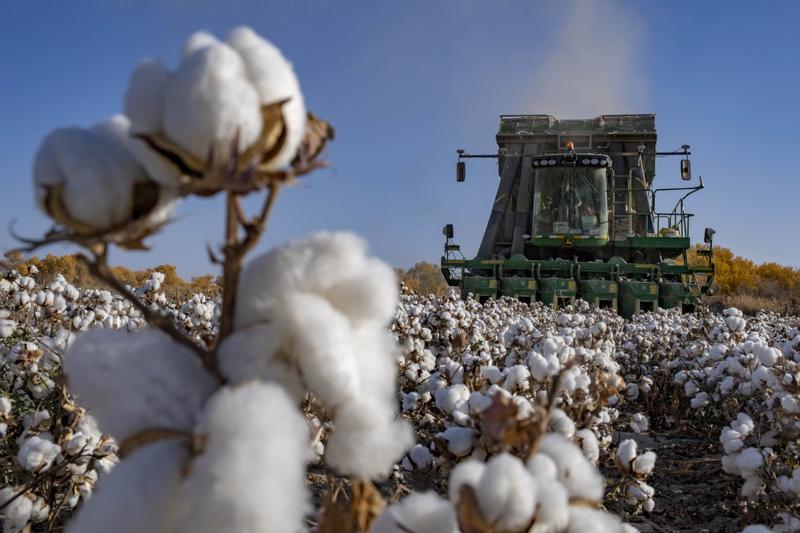 A harvesting machine picks cotton in a field in Shaya county, Aksu, Xinjiang Uygur autonomous region. (XINHUA)
A harvesting machine picks cotton in a field in Shaya county, Aksu, Xinjiang Uygur autonomous region. (XINHUA)
BEIJING - The China Chamber of Commerce for Import and Export of Textiles on Saturday urged the United States to revoke all its sanctions and suppressions on Xinjiang-made textiles.
The US side has recently signed the so-called "Uyghur Forced Labor Prevention Act" into law, which bans imports of textile-related products from China's Xinjiang Uygur Autonomous Region.
The US accusation of the so-called "forced labor" issue is purely fabricated out of thin air and has no factual basis, said the China Chamber of Commerce for Import and Export of Textiles
The move completely violated market principles and the rules of the World Trade Organization, disrupted international trade order, and severely damaged the interests of textile and apparel manufacturers and consumers in China and the United States, the chamber said in a statement.
READ MORE: Xinjiang cotton: Who the real victims are
The US accusation of so-called "forced labor" issue is purely fabricated out of thin air and has no factual basis, the statement reads. It stressed that China's textile and apparel industry has been committed to safeguarding workers' rights and interests, and has provided stable and efficient supply chain services for the global market.
For the common interests of both sides, the chamber is willing to strengthen communication with related organizations and sectors from the United States, and strive to maintain the stability of bilateral economic and trade relations in the textile and apparel industry, according to the statement.
Meanwhile, the chamber said it hoped that global textile and apparel firms and consumers, including those in the United States, can see through the US long-lasting attempts at smearing China's image and curbing China's development in the name of "human rights," and make their own judgement based on facts and truth.
The China National Textile and Apparel Council expressed a similar sentiment in a statement on Saturday.
China's textile industry fully agrees with the relevant positions of the Chinese government. In March this year and in 2020, the council released statements condemning the relevant movement of the US and the actions of some international brands of excluding the use of cotton produced in the Xinjiang Uygur autonomous region.
The cotton produced in Xinjiang is recognized as a high-quality natural fiber raw material, and it meets the rigid consumption demand for cotton textiles and clothing globally, said China National Textile and Apparel Council
The latest signing of the act tries to impose the label of "forced labor" on all commodities produced in Xinjiang in the way of "presumption of guilt." It sets a bad and dangerous precedent in international economic and trade rules, the council said.
The US' measures of banning imports from Xinjiang and issuing malicious threats against multinational companies' independent procurement of Xinjiang products violates fair and reasonable market economy and free trade rules. In essence, it is a bullying behavior that seriously violates the basic human rights of people in Xinjiang, and interferes and destroys international supply chains, the statement reads.
The cotton produced in Xinjiang is recognized as a high-quality natural fiber raw material, and it meets the rigid consumption demand for cotton textiles and clothing globally, the statement reads.
In the past few years, the cotton planting and production in Xinjiang has remained stable, and the local textile and garment industry has developed rapidly, which has played an important role in promoting regional economic development. This year, the total cotton output in Xinjiang reached 5.13 million metric tons, accounting for about 20 percent of the total cotton output globally, the council said.
ALSO READ: China opposes US act on so-called Uyghur forced labor
As the representative of the collective interests of China's textile and garment industry, the council and 12 industry associations in the textile industry chain promise that they will continue to firmly support the planting and production of cotton in Xinjiang. They will also support the trade and consumption of Xinjiang cotton at home and abroad and fully support the prosperity and development of Xinjiang's textile and garment industry.
The council said it believes that justice is in the hearts of people. China's textile industry will work closely with global partners to eliminate interference and fully ensure the normal operation of the international textile and garment industry chain supply chain.
With Xinhua inputs


